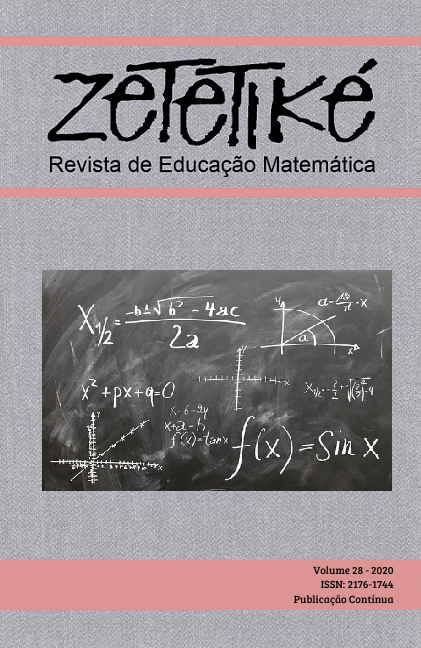Abstract
The purpose of this article is to analyse aspects of self-knowledge mobilised by preservice mathematics teachers in the vaivém regarding the movement of constitution of their Professional Identity (PI). Vaivém is a tool of written communication between the teacher supervisor and the teacher in training. This is qualitative research of an interpretative nature, focused on the vaivéns produced by the trainee teachers in two disciplines (taught in the third and fourth years) of a mathematics teaching degree course. We could observe that the vaivém was configured as an opportunity for preservice mathematics teachers to analyse personal and professional elements in an articulated way, understand their actions as students and teachers, reflect on their professional choices and desires, and to think about their professional future. Such reflections and analyses were supported by the fact that the vaivém is interactive, questioning, temporal, and problematises all trainees' written production. Hence, the vaivém is revealed as a potential instrument to analyse aspects of the movement of constitution of the PI of the preservice mathematics teachers, mainly regarding one of its dimensions: self-knowledge.
References
Beijaard, D., Paulien, P. C., & Verloop, N. (2004). Reconsidering research on teachers’ professional identity. Teaching and teacher education, 20(2), 107-128.
Cattley, G. (2007). Emergence of professional identity for the pre-service teacher. International Education Journal, 8(2), 337-347.
Cyrino, M.C.C.T. (2016). Mathematics teachers’ professional identity development in communities of practice: reifications of proportional reasoning teaching. Bolema, 30(54), 165-187. doi: 10.1590/1980-4415v30n54a08.
Cyrino, M.C.C.T. (2017). Identidade Profissional de (futuros) Professores que Ensinam Matemática. Perspectivas da Educação Matemática, 10(24), 699-712.
Garcia, T. M. R. (2014). Identidade Profissional de Professor de Matemática em uma Comunidade de Prática. 2014. 161 f. Tese de Doutorado em Ensino de Ciências e Educação Matemática, Universidade Estadual de Londrina, Londrina.
Gohier, C., Anadón, M., Bouchard, Y., Charbonneau, B., & Chevrier, J. (2001). La construction identitaire de l'enseignant sur le plan professionnel: Un processus dynamique et interactif. Revues des Sciences de l'Education, 27(1), 1-27.
Hall, S. (2015). A identidade cultural na pós-modernidade (12a ed., T.T. da Silva & G. L. Louro, Trads.). Rio de Janeiro: Lamparina.
Kelchtermans, G. (2009). Who I am in how I teach is the message: Self-understanding, vulnerability and reflection. Teachers and Teaching: theory and practice, 15(2), 257- 272.
Kelchtermans, G., & Hamilton, M.L. (2004). The dialectics of passion and theory: Exploring the relation between self-study and emotion. In J. Loughran, M. L. Hamilton, V. Kubler, Laboskey, & T. Russell (Eds.), The International handbook of self-study of teaching and teacher education practices (pp. 785–810). Dordrecht: Kluwer Academic Publishers.
Lasky, S. (2005). A sociocultural approach to understanding teacher identity, agency and professional vulnerability in a context of secondary school reform. Teaching and Teacher Education, 21(8), 899-916.
Phillips, E., & Crespo, S. (1995, April). Math Penpals! Developing written communication in Mathematics (pp. 1-18). Paper presented at Annual Meeting of the American Educational Research Association. San Francisco.
Silva, G. S. (2018). Trajetórias de avaliação e a perspectiva de avaliação do Gepema. 144 f. Dissertação de Doutorado em Ensino de Ciências e Educação Matemática, Centro de Ciências Exatas, Universidade Estadual de Londrina, Londrina.
Soreide, G. E. (2006). Narrative construction of teacher identity: positioning and negotiation. Teacher and Teaching, 12, 527-547.
Spilková, V. (2011). Development of student teachers’ professional identity through constructivist approaches and self-reflective techniques. Orbis Scholae, 5(2), 117-138.
Teixeira, B. R. (2013). O Estágio Supervisionado e o desenvolvimento profissional de futuros professores de Matemática: uma análise a respeito da identidade profissional docente. 2013. 184 f. Tese de Doutorado do Programa de Pós-Graduação em Ensino de Ciências e Educação Matemática, Centro de Ciências Exatas, Universidade Estadual de Londrina, Londrina.
Watson, C. (2006). Narratives of practice and the construction of identity in teaching. Teachers and Teaching: Theory and Practice, 12(5), 509-526.

This work is licensed under a Creative Commons Attribution-NonCommercial-NoDerivatives 4.0 International License.
Copyright (c) 2020 Zetetike


